|
|
|
|
|
|
|
|
|
|

|

|

|

|
Walks | From RussellRussell Village | Matauwhi Bay | To Long Beach
Long Beach and Waitata Bay
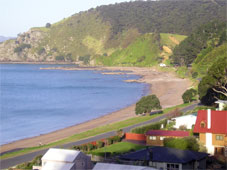
Long Beach
(Oneroa Bay) is a very lovely, long, safe, sandy,
all-tide swimming beach facing north-east with great
views across the islands of the Bay to the Cape Brett
peninsular and north to the open sea.
Around some rocks at the north western end is the smaller
but sometimes more sheltered Waitata Bay (Donkey Bay). A
high-tide track above the beach is an alternative access.
Rock-hoppers (or keen fishers) can continue around the
coast north of Waitata Bay to more fishing spots and
eventually at low tide even to Rocky Bay at Tapeka.
|
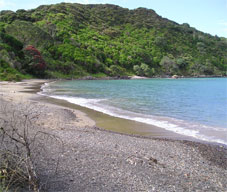
Location,
Grade and Duration
Long Beach
can be reached on foot or by vehicle. See Long Beach Walkway for
further details.
Long Beach is about a kilometre long and Long Beach Road
extends some 700 metres along it so for this portion both
the beach and the road may be walked and both are flat.
The high tide track to Waitata Bay is an easy but narrow
dirt track with some steps. Those nervous of heights may
not like a narrow section several metres above the beach.
The rocky outcrop between Long Beach and Waitata Bay
requires a little agility.
|
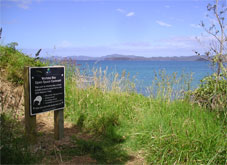
Restrictions
Dogs are not
allowed on the main beach alongside the road in the
summer months during the day. However they are allowed on
the beach at both ends beyond the road at all times if
under control and kept off the private properties
adjoining the beach. The Waitata Bay high-tide track is
administered by the QE2 Trust and dogs are forbidden both
there and on the DoC headland reserve at the northern tip
of Wiatata Bay.
There are toilets at the northwest end of Long Beach.
There are no shops at the beaches.
For many years secluded Waitata Bay has occasionally been
used as a naturist bathing beach so be prepared for this
if you go there.
|
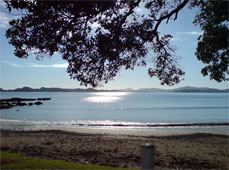
Interests
Swimming,
fishing, boating, sunbathing, beach games and strolling
are all popular.
There is a shag (cormorant) colony nearby and dolphins
sometimes visit.
There may be a large surf particularly at the southern
end in northerly weather.
|
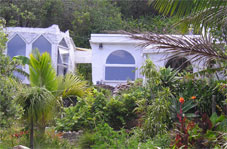
History
The Maori
name for Long Beach is Oneroa:
"one" (pronounced aw-knee,
meaning 'sand') and
"roa" (raw-ah, meaning
'long').
The first few holiday baches were built at Long Beach in
the 1920s but after World War II its popularity soared.
Adobe Cottage, at the road entrance to Long Beach, was
built in the 1940s by Charlotte Larkin. Aged in her
sixties, she built it from bricks made with clay and sand
found on site. The cottage with its unusual windows still
attracts visitors today but her dream was to inspire
young men returning from the war, so that they would be
able to build their own homes. Russell Museum has an
interesting booklet for sale,
'Puawananga'
(clematis), with further information.
The big headland between the Tapeka rocks and the little
bay of Waitata and Oneroa/Long Beach was named
'Temple Bar' by
Russell children many years ago, although no-one
remembers why. During WW2 this headland was fortified by
the Navy and Army and known by its official name of
'C Section'. Few
people today remember the great guns of C Section, or the
powerful searchlight which was installed halfway down the
cliff. The headland is a conservation reserve and
remnants of the fortifications can still be found on it.
Waitata Bay, tucked between Temple Bar and Long Beach,
was once owned by a family who kept donkeys so it was
often called 'Donkey
Bay'.
|
Walks | From RussellRussell Village | Matauwhi Bay | To Long Beach
|

|

|

|

|
|
|
|
|
|
|